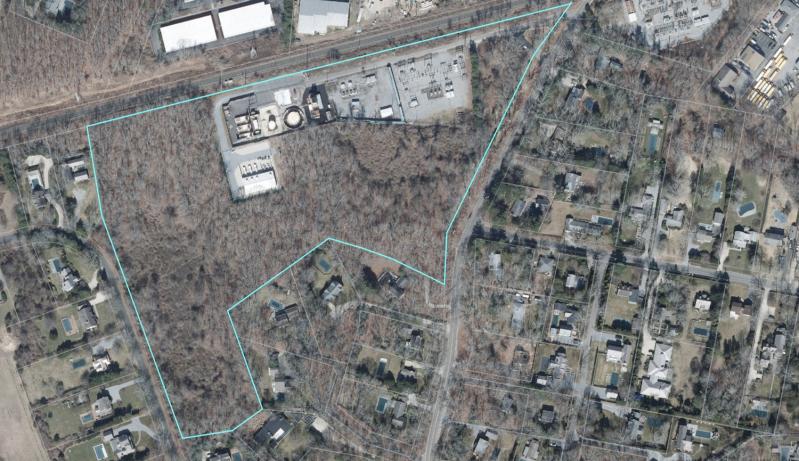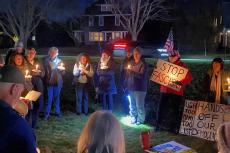The 5-megawatt lithium-ion battery energy storage system that caught fire at a Cove Hollow Road, East Hampton, substation on May 31 will be out of commission for an unknown length of time, but while its owners say there are no safety or power concerns for residents, proponents of renewable energy are concerned that the fire will fuel calls for a moratorium on further installations.
“We are working diligently to repair the facility, and expect to do so over the coming months,” Mike Mazur, a spokesman for NextEra Energy Resources, said on behalf of that company and its partner on the project, National Grid, in an email. “We will have a more definitive timeline and damage assessment once a thorough review is complete.”
PSEG Long Island system operations “can manage the peak load this summer without the East Hampton battery,” according to a fact sheet provided to The Star by the Long Island Power Authority.
Mr. Mazur stressed that the installation’s “water-based fire suppression systems operated as designed and quickly contained the fire to the site. No further emergency response was required.”
While e-bikes are in the news both for their exploding popularity and several instances of their lithium batteries igniting, even causing fatal fires, “lithium batteries in utility-scale energy storage applications are installed and arranged differently from small-scale consumer products,” Mr. Mazur said. “Our energy storage facilities are managed, monitored, and cooled in a controlled manner to keep the equipment functioning safely,” he added, and NextEra’s energy storage facilities have “extensive fire protection systems, which respond immediately to an incident,” as he said was demonstrated in East Hampton.
A portion of another battery storage facility in New York, this one in Warwick, caught fire on June 27. While no one was injured in either fire, the timing could not have been worse for proponents of battery energy storage systems, or BESS: The Southampton Town Planning Board has before it an application from Rhynland Energy for such an installation on North Road in Hampton Bays, a property close to Montauk Highway, the Long Island Rail Road track, and the Shinnecock Canal. The planning board previously issued a negative declaration under the State Environmental Quality Review Act, meaning the project would not have a significant adverse environmental impact.
Eleven residents spoke against the proposal at the Southampton Town Board’s June 27 meeting, with no one speaking in favor of it. A petition on change.org demanding that the project be halted had 2,389 signatures as of yesterday morning. The board will hold a public hearing on a three-month moratorium on new BESS applications on Tuesday, though the proposed installation on North Road is not expected to be subject to a moratorium, should one be enacted.
“No one wants a lithium battery storage facility in their neighborhood,” Brigid Maher, who started the change.org petition, told the board at the June 27 meeting.
Another speaker mused that he may move from Hampton Bays “before this bomb goes off,” and a third, who identified himself as a former New York City fireman, likened the hazard of being sent to extinguish a fire at a BESS to being sent into the World Trade Center on Sept. 11, 2001.
“There is a lot of misinformation and incorrect information that is being passed around,” Lynn Arthur of the Sustainable Southampton Green Advisory Committee said, yet “there is no one entity that owns responsibility to educate the public.”
Among 466 BESS projects, there have been 11 fires and no fatalities, according to the United States Energy Information Administration. Four first responders have been injured, all of them at the same incident in Arizona in 2019. Improper training, old battery chemistry that is no longer the industry standard, and an old structure that allowed for a buildup of gases from the fire were blamed. The agency notes that the East Hampton fire was self-contained, with no injuries or external intervention required.
“Some people are ginning up fear, uncertainty, and doubt, and calling for a moratorium when what they really need is education,” Ms. Arthur said. “I would caution the public not to accept what they hear or read on social media at face value.”
She added that in addition to the state’s goal to reduce greenhouse gas emissions to 40 percent below 1990 levels by 2030 and to 85 percent below 1990 levels by 2050, the Climate Leadership and Community Protection Act of 2019 included a mandate for 3,000 megawatts of energy storage by 2030 that was subsequently increased by Gov. Kathy Hochul to at least 6,000 megawatts. “Part of the reason why LIPA is saying ‘bring your proposals to us’ is that we have to provide a carbon-free grid. In order to do that, we need battery storage systems. There is no other technology that can perform that role.”
Batteries are needed to store electricity generated by offshore wind, Ms. Arthur said, with the South Fork Wind farm scheduled to be operational by year’s end. They are also needed to provide resilience against severe storms and power failures resulting from extreme heat and high demand, and to replace fossil fuel-burning “peaker” plants that operate during times of peak demand. The latter are “the least efficient plants,” she said, and “some have no pollution controls at all, so they are the most polluting energy assets on the grid.”
“We have to ditch fossil fuels,” agreed Lena Tabori of East Hampton’s energy sustainability advisory committee. “We have to embrace the transition to energy from clean and renewable sources which need to reach us through the electrical grid.” The intermittent nature of sunshine and wind “hampers what we can receive from renewables,” she said. “So, we need to strengthen our electric grid and expand our ability to store power.”
Battery storage, she said, “will load-balance our grid as, for example, our spectacular offshore turbines come online this fall. . . . It will help LIPA balance peak load in the summer. We can’t possibly reduce our reliance on fossil fuels and accelerate our reliance on clean energy, not to mention renewable, without strengthening our electric grid capacity and storing power for when we aren’t producing it and yet still need it.”
“Let’s defer any discussion of a moratorium until after the facts are laid out,” Ms. Arthur said, “so a good outcome can be determined by the powers that be.”




